Text

I can't stress enough how much I miss StumbleUpon
178K notes
·
View notes
Text
Beginners Guide to Descriptive Sentences
Hi writers.
I’m Rin T, and in this post I’m excited to share with you a detailed guide on how to craft vivid descriptions and descriptive sentences for your writing. I’ve long believed that descriptive writing is the magic that turns ordinary text into an immersive experience. When done well, every sentence acts like a brushstroke that paints a scene in the reader’s mind.
──────────────────────────── Why Descriptive Writing Matters ────────────────────────────
I have seen how powerful descriptions can engage readers and establish a strong connection with the narrative. Descriptive writing is not simply about decorating your work; it is about building an atmosphere that transports your reader to a world. your world.
When you write descriptions, remember:
You are setting the tone.
You are building a world.
You are evoking emotions.
You are inviting your readers to experience your story with all their senses.
──────────────────────────── Step-by-Step: Crafting Vivid Descriptions ────────────────────────────
Below are my personal tips and tricks to help you build detailed and captivating descriptions:
Begin With the Senses
Description does not solely depend on what the eyes can see. Consider sound, smell, taste, and touch. For instance, instead of writing “The witch’s hut was eerie,” try elaborating: “The witch’s hut exuded an eerie aura. The creaking timber and distant echoes of whispering winds mingled with the pungent aroma of burnt sage and mysterious herbs.” In this way, you help the reader not only see the scene but also feel it.
Choose Precise and Evocative Language
Precision in language is vital. Replace generic adjectives with specific details to boost clarity and imagery. Rather than “The forest was dark,” consider: “The forest was a labyrinth of shadowed boughs and muted undergrowth, where the light barely touched the spindly branches, and every step unveiled whispers of ancient spells.” Specific details create tangible images that stay with readers.
Show, Don’t Just Tell
A common mistake is to “tell” the reader how to feel, rather than “showing” it through context and detail. Instead of writing “It was a spooky night,” immerse your reader: “Under a pallid crescent moon, the night unfurled like a canvas of foreboding whispers; broken branches and rustling leaves narrated the secrets of a long-forgotten curse.” By showing the elements, you invite the reader to experience the fear and mystery firsthand. (You don't need to be as dramatic as my examples, but this is simply for inspiration)
Use Figurative Language Thoughtfully
Metaphors, similes, and other figures of speech lend an artistic flair to your descriptions. When writing about a scene in a magical world, you might say: “Her eyes shone like twin beacons of moonlit silver, cutting through the gloom as if to part the veil of night itself.” Such comparisons evoke emotions and deepen the reader’s connection with the scene. However, be cautious not to overdo it; a little figurative language can go a long way.
Strike a Balance Between Details and Pacing
While elaborate descriptions are alluring, too many details can weigh down your narrative. Consider introducing the broader scene first and then focusing on key elements that define the mood. For instance, start with an overview: “The village lay nestled between ancient stone arches and mist-covered hills.” Then, zoom into details: “A solitary, ivy-clad tower sent spiraling tendrils of mist into the twilight, as if guarding secrets of a long-lost incantation.” This technique creates a rhythm, drawing readers in gradually.
──────────────────────────── Practical Exercises to Enhance Your Descriptive Writing ────────────────────────────
To help you practice these techniques, try the following exercises:
Sensory Detail Drill: Select a familiar scene from your fantasy world (for example, a witch’s secluded garden). Write a short paragraph focusing on each of the five senses. What do you taste as you bite into a magical fruit? What sounds resonate in the quiet of the enchanted night? This drill helps you to avoid flat descriptions and encourages you to integrate sensory experiences.
Revision and Refinement: Take a simple sentence like “The night was cold,” and transform it using the advice above. Rework it into something like, “The night was a canvas of shimmering frost and darkness, where every breath of the wind carried a hint of winter’s sorrow.” Compare the two, and notice how minor adjustments can dramatically heighten the mood.
Peer Review Sessions: Sharing your work can offer invaluable insights. Exchange your descriptions with fellow writers and ask for focused feedback, Does the description evoke the intended emotion? Does it deliver a clear image? Use these sessions as opportunities to improve and refine your craft.
──────────────────────────── Common Pitfalls and How to Avoid Them ────────────────────────────
Through my years of writing, I've learned that even the most passionate writers can stumble. Here are some pitfalls to watch out for:
Overloading With Adjectives: While it’s tempting to create elaborate descriptions, too many adjectives and adverbs can distract rather than enhance. Aim for clarity and purpose in every word. Instead of “a very dark, spooky, frightening forest filled with creepy sounds,” try “a forest shrouded in ominous silence, where every rustle hinted at unseen mysteries.”
Falling Into Clichés: Familiar images can sometimes render your work predictable. Try to avoid worn phrases. Instead of “as dark as night,” imagine “as impenetrable as the void that separates worlds.” Unique expressions capture attention and create lasting impressions.
Neglecting the Flow: Descriptions are vital, but the narrative must continue to drive forward. Check that your detailed passages serve to enhance the storyline rather than bog it down. Ask yourself: Does this description bring the reader closer to the action, or does it detract from the momentum of the narrative?
──────────────────────────── Advanced Techniques for the Aspiring Writer ────────────────────────────
Once you’re comfortable with the basics, consider these advanced methods to elevate your descriptions into artful prose:
Integrate Descriptions Seamlessly: Instead of isolating your descriptions, weave them into dialogue and action. For example, as a witch brews her potion, you might describe the bubbling cauldron and swirling mists as part of her incantation, not just as a standalone scene. “As she whispered the ancient words, the cauldron responded, its surface rippling like a dark mirror reflecting centuries of secrets.”
Reflect Character Perspectives: Let your characters’ emotions color the scene. If a character fears a looming threat, their perception will add a layer of tension to the environment. “I entered the dim corridor with trepidation, my heart pounding as the flickering torchlight revealed spectral figures dancing along the walls.” This technique makes the description both situational and personal.
Use Rhythm: The cadence of your sentences can mirror the pace of your narrative. In high-tension moments, short, abrupt sentences heighten the urgency. Conversely, in serene scenes, longer, flowing sentences can create a tranquil atmosphere. Experiment with sentence structure until you find a balance that suits both your style and the mood you wish to convey.
──────────────────────────── Final Thoughts and Encouragement ────────────────────────────
your narrative is your unique creation. you too will find your distinctive voice. I encourage you to keep experimenting with different techniques until your descriptions feel both natural and mesmerizing. Write freely, revise diligently, and most importantly, let your creative spirit shine through every line.
Thank you for joining me. I hope these tips can help you.
2K notes
·
View notes
Text
can you guys watch my squab for me im gonna go on my smoko

127K notes
·
View notes
Text
Found my fav Slay the Princess route recently. Dragon my beloved. Your horrifying beak mouth was an impossible-to-refuse lip syncing challenge 💖
Shoutouts to @blacktabbygames for making such a cool game!
36K notes
·
View notes
Text
🎮 HEY I WANNA MAKE A GAME! 🎮
Yeah I getcha. I was once like you. Pure and naive. Great news. I AM STILL PURE AND NAIVE, GAME DEV IS FUN! But where to start?
To start, here are a couple of entry level softwares you can use! source: I just made a game called In Stars and Time and people are asking me how to start making vidy gaems. Now, without further ado:
SOFTWARES AND ENGINES FOR PEOPLE WHO DON'T KNOW HOW TO CODE!!!
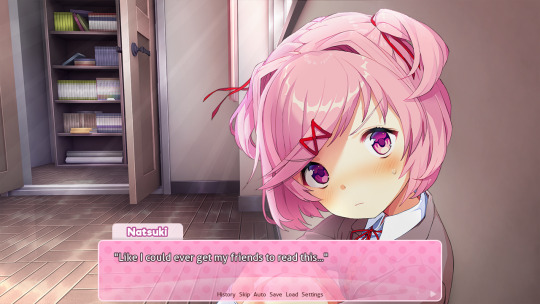
Ren'py (and also a link to it if you click here do it): THE visual novel software. Comic artists, look no further ✨Pros: It's free! It's simple! It has great documentation! It has a bunch of plugins and UI stuff and assets for you to buy! It can be used even if you have LITERALLY no programming experience! (You'll just need to read the doc a bunch) You can also port your game to a BUNCH of consoles! ✨Cons: None really <3 Some games to look at: Doki Doki Literature Club, Bad End Theater, Butterfly Soup
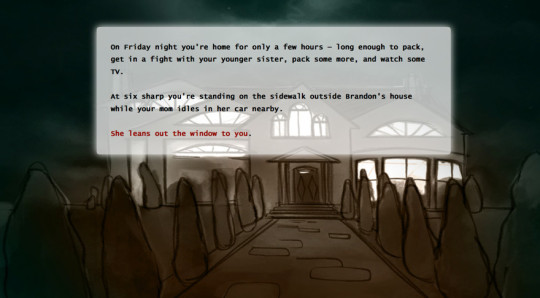
Twine: Great for text-based games! GREAT FOR WRITERS WHO DONT WANNA DRAW!!!!!!!!! (but you can draw if you want) ✨Pros: It's free! It's simple! It's versatile! It has great documentation! It can be used even if you have LITERALLY no programming experience! (You'll just need to read the doc a bunch) ✨Cons: You can add pictures, but it's a pain. Some games to look at: The Uncle Who Works For Nintendo, Queers In love At The End of The World, Escape Velocity

Bitsy: Little topdown games! ✨Pros: It's free! It's simple! It's (somewhat) intuitive! It has great documentation! It can be used even if you have LITERALLY no programming experience! You can make everything in it, from text to sprites to code! Those games sure are small! ✨Cons: Those games sure are small. This is to make THE simplest game. Barely any animation for your sprites, can barely fit a line of text in there. But honestly, the restrictions are refreshing! Some games to look at: honestly I haven't played that many bitsy games because i am a fake gamer. The picture above is from Under A Star Called Sun though and that looks so pretty
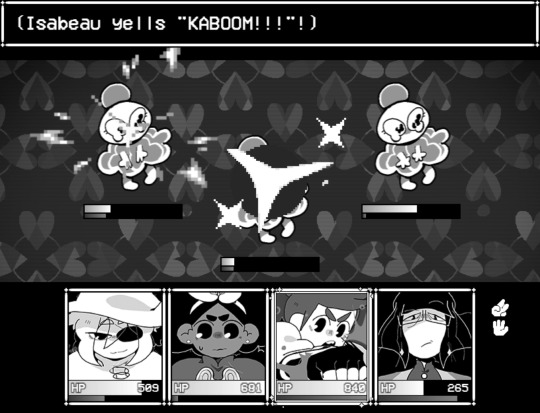
RPGMaker: To make RPGs! LIKE ME!!!!! NOTE: I recommend getting the latest version if you can, but all have their pros and cons. You can get a better idea by looking at this post. ✨Pros: Literally everything you need to make an RPG. Has a tutorial inside the software itself that will teach you the basics. Pretty simple to understand, even if you have no coding experience! Also I made a post helping you out with RPGMaker right here! ✨Cons: Some stuff can be hard to figure out. Also, the latest version is expensive. Get it on sale! Some games to look at: Ib, Hylics, In Stars and Time (hehe. I made it)
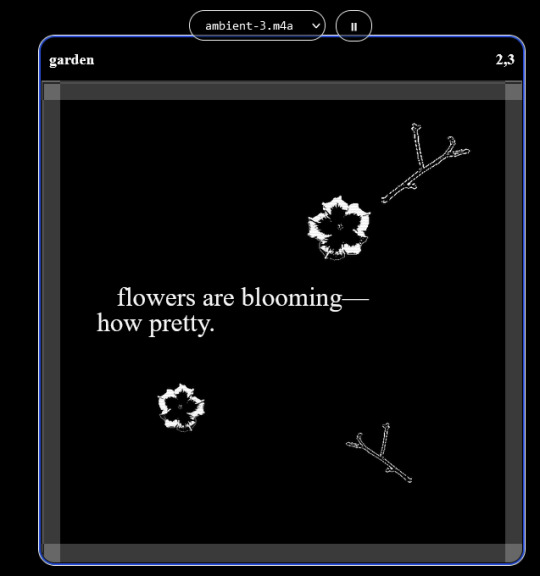
engine.lol: collage worlds! it is relatively new so I don't know much about it, but it seems fascinating. picture is from Garden! NOTE: There's a bunch of smaller engines to find out there. Just yesterday I found out there's an Idle Game Maker made by the Cookie Clicker creator. Isn't life wonderful?
✨more advice under the cut. this is Long ok✨
ENGINES I KNOW NOTHING ABOUT AND THEY SEEM HARD BUT ALSO GIVE IT A TRY I GUESS!!!! :
Unity and Unreal: I don't know anything about those! That looks hard to learn! But indie devs use them! It seems expensive! Follow your dreams though! Don't ask me how!
GameMaker: Wuh I just don't know anything about it either! I just know it's now free if your game is non-commercial (aka, you're not selling it), and Undertale was made on it! It seems good! You probably need some coding experience though!!!
Godot: Man I know even less about this one. Heard good things though!
BUNCHA RANDOM ADVICE!!!!
-Make something small first! Try making simple: a character is in a room, and exits the room. The character can look around, decide to take an item with them, can leave, and maybe the door is locked and you have to find the key. Figuring out how to code something like that, whether it is as a fully text-based game or as an RPGMaker map, should be a good start to figure out how your software of choice works!
-After that, if you have an idea, try first to make the simplest version of that idea. For my timeloop RPG, my simplest version was two rooms: first room you can walk in, second room with the King, where a cutscene automatically plays and the battle starts, you immediately die, and loop back to the first room, with the text from this point on reflecting this change. I think I also added a loop counter. This helped me figure out the most important thing: Can This Game Be Made? After that, the rest is just fun stuff. So if you want to make a dating sim, try and figure out how to add choices, and how to have affection points go up and down depending on your choices! If you want to make a platformer, figure out how to make your character move and jump and how to create a simple level! If you just want to make a kinetic visual novel with no choices, figure out how to add text, and how to add portraits! You'll be surprised at how powerful you'll feel after having figured even those simple things out.
-If you have a programming problem or just get confused, never underestimate the power of asking Google! You most likely won't be the only person asking this question, and you will learn some useful tips! If you are powerful enough, you can even… Ask people??? On forums??? Not me though.
-Yeah I know you probably want to make Your Big Idea RIGHT NOW but please. Make a smaller prototype first. You need to get that experience. Trust me.
-If you are not a womanthing of many skills like me, you might realize you need help. Maybe you need an artist, or a programmer. So! Game jams on itch.io are a great way to get to work and meet other game devs that have different strengths! Or ask around! Maybe your artist friend secretly always wanted to draw for a game. Ask! Collaborate! Have fun!!!
I hope that was useful! If it was. Maybe. You'd like to buy me a coffee. Or maybe you could check out my comics and games. Or just my new critically acclaimed game In Stars and Time. If you want. Ok bye
36K notes
·
View notes
Text
youtube is pulling this bullshit again

praying for the firefox gods to save me once more...
69K notes
·
View notes
Text
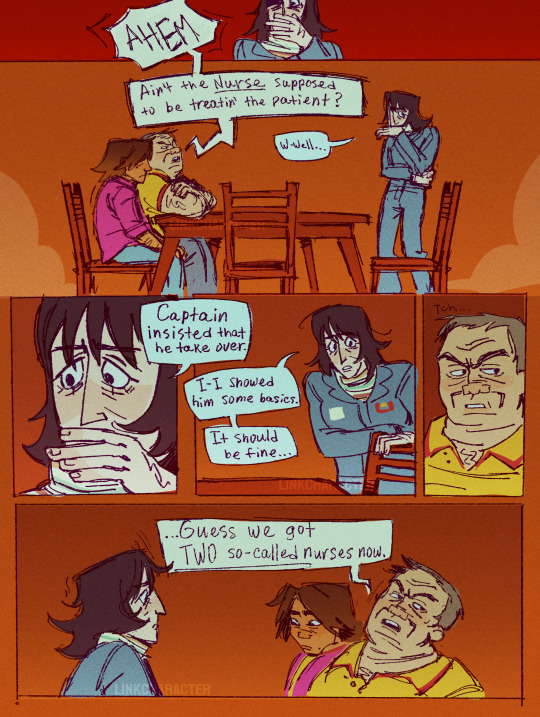

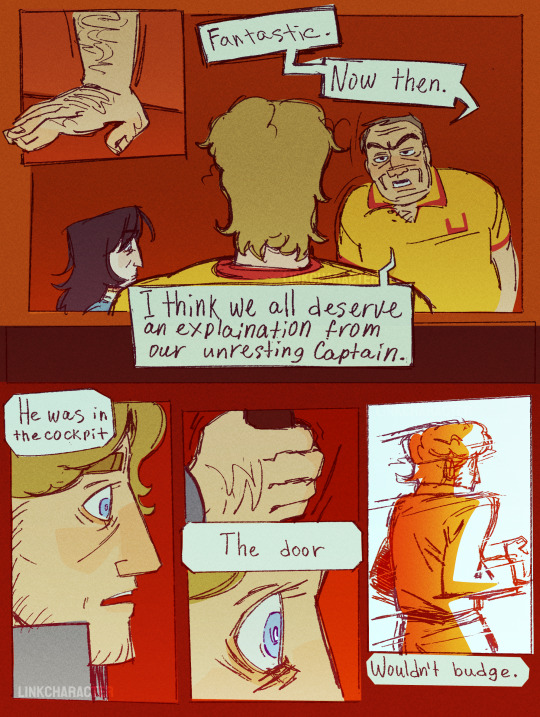


Our Captain doomed us all
Jimblasted AU intro
18K notes
·
View notes
Text
Lads we've done it again.
Me and my incredible super amazing jaw dropping talented friend @calista-222 continued on from that first reanimation of LMK and did another one ! (season 3, episode 9) BUT THIS TIME WITH MAD COOL COLORS AND BACKGROUNDS ??? WHAOG
I did the inbetweening and lip synching, and super duper amazing @calista-222 did the keyframes, colors (+ lights and shadows), and backgrounds. Storyboarding and figuring out the movements was a team effort, and it was really fun ✨

GO CHECK OUT THE COOL WIPS !
5K notes
·
View notes
Text
Reading amazing fanfiction, then forgetting to bookmark it

472K notes
·
View notes
Text
35K notes
·
View notes






